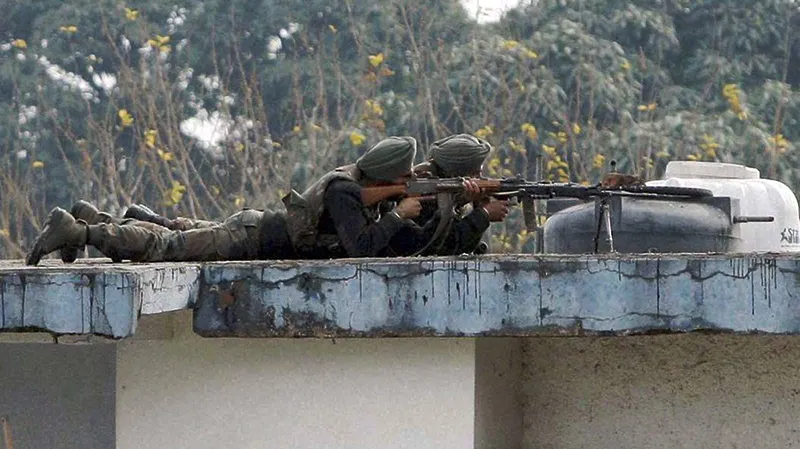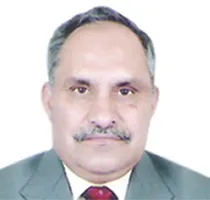As the operations at the Pathankot Airbase wind down, it is but natural that they will now come under intense and thorough scrutiny, given the manner in which it played out and the disproportionate level of casualties incurred and time taken in neutralizing six terrorists. Both the investigations by the National Investigating Agency (NIA) and the Air Force Court of Inquiry will not have the professional expertise to go into the actual conduct of the counter-terror operations and we are thus likely to find that lessons that emerged will neither be highlighted nor learnt. This is clear from the official attempts to give a positive spin to events. For example, Google Maps clearly indicates that the airport extends approximately 4 Km by 3 Km which makes the periphery 14 Km and not 25 Km as the Defence Minister has suggested.
Both, the investigations by the NIA and the Air Force Court of Inquiry will not have the professional expertise to go into the actual conduct of the counter-terror operations and we are thus likely to find that lessons that emerged will neither be highlighted nor learnt.
Clearly the Air Base is not the only high value target in Pathankot and whatever the credibility of the intelligence to just focus on that would have been a grave error, given that the information could easily have been an attempt at deception. To ensure relatively fool proof protection against any intrusion would have required nearly a battalion and a half to cover the 14 Km frontage. It is possible that such quantum of troops was not available and therefore chances of small group of militants being able to intrude without being detected were a distinct possibility. Therefore their inability to either reach the technical area without detection or destroy any of our air assets was certainly a feather in the cap of the Security Forces deployed.
That being said, this attack clearly highlights the deep flaws that have always existed in our national security architecture despite the unending series of terror attacks that have inflicted enormous casualties over the years. The political leadership of all parties has absolved themselves of the responsibility of ensuring security of the common man and has only selfishly ensured that their own protection and that of their kith and kin is attended to by gifting themselves larger and larger personal security details at the tax payers cost. For example, the utilization of personnel of the Special Ranger Groups from the National Security Guards (NSG) for personal protection of VIPs, the ubiquitous “Black Cat Commandos”, is neither authorized by the NSG Act nor a task that they were established to perform. It is an issue that needs to be resolved at the earliest.
We need to be clear that the security of each Air Force station rests solely with the Station Commander of that base. In this he is assisted by the Station Security Officer who has under him elements from the Air Force Police, Defence Security Corps and, in some cases, Garud Commandos who provide the Quick Reaction Team for dealing with contingencies that may arise. It therefore stands to reason that in case a situation demands the provision of additional security resources to counter any unexpected or unforeseen threat, then these would be placed under the Station Security Officer who is best conversant to deploy them.
Instead of bringing in an Infantry Battalion with the requisite capability and giving it the task of protecting the air base, grand standing and theatrics were resorted to which undoubtedly led to a complete breakdown of the command and control channels.
Circumstances may arise where threat assessments require reinforcements being brought in which are beyond the professional capability of the Station Security Officer to handle. In such circumstances, ideally a unit with the capability to deal with likely threat is inducted and its commander then assumes responsibility for protection of a specific sector or an asset, orif necessary, the complete base. If that were to be the case, then all protective assets integral to the base would also be placed under his command and the Station Security Officer would assist him as required. In all of this he would be reporting to the Station Commander who continues to be responsible for the overall security of his base and all assets therein.
There can be little doubt that this was not the case in the present instance. Instead of bringing in an Infantry Battalion with the requisite capability and giving it the task of protecting the air base, grand standing and theatrics were resorted to which undoubtedly led to a complete breakdown of the command and control channels. Diffused authority adversely impacted the coordination and conduct of operations.One is in little doubt that whoever was responsible for the decision to induct elements of the Special Action Group of the NSG and place the NSG in charge of the operation is wholly responsible for the subsequent confusion that occurred. Only this can explain as to why elements from the Army Special Forces inducted earlier, and the only ones with the requisite experience, training and organization were brushed aside on the arrival of the NSG.
The NSG is organized and trained to carry out counter terror intervention operations and not meant to provide a protective shield against a terror attack. Off course, the very fact that the NSG accepted a task for which they were neither trained nor equipped speaks poorly of their top hierarchy, which obviously wanted to corner the glory and must also take a part of the blame. While it is understandable that the Station Commander may have found his authority eroded because of the induction of forces working directly under the highest levels of the Central Government, the Air Force hierarchy has certainly not distinguished itself by its abrogation of responsibility.That the Air Force preferred assistance from the NSG instead of the Army clearly points to the utter lack of “jointness” within the Armed Forces. A situation further exacerbated due to the inability and unwillingness of the political leadership, through the years, of putting in place a Chief of Defence Staff with the requisite authority and staff.
It is increasingly clear that Mr. Ajit Doval, the National Security Advisor, is being correctly seen as responsible for the fiasco by some analysts as without his approval the NSG could not have been inducted. He appears to have forgotten that he is the Security Advisor to the Prime Minister and neither the de-facto Chief of Defence Staff nor the tactical commander in the field. This unhealthy practice of overseeing tactical operations first emerged during the Special Forces raid on terrorist camps on the Manipur- Myanmar border, though that interference in the chain of command could be justified to some extent since it involved a politically sensitive special operation. The present situation hardly required such unwarranted interference and has only resulted in avoidable confusion.
Finally, the Government needs to take a long and hard look at the criminal-drug- smuggling linkages and the reported involvement of politically influential persons in such trade. As long as these people can get away with their nefarious activities, the national security of this country will remain vulnerable as they are able to involve personnel from the security establishment in their activities. It is an undisputed fact that terrorists take full advantages of this criminal nexus to further their own aims. This certainly seems to have been the case here as well.
This article originally appeared in Indian Defence Review.
The views expressed above belong to the author(s). ORF research and analyses now available on Telegram! Click here to access our curated content — blogs, longforms and interviews.

